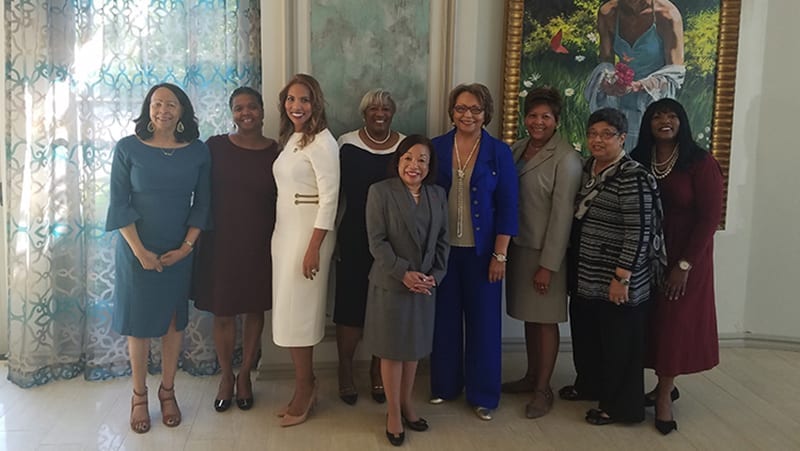INSPIRE
More Women Presidents Leading Member HBCUs

(From left to right) Dr. Phyllis Worthy Dawkins, Bennett College; Dr. Colette Pierce Burnette, Huston-Tillotson University; Dr. Roslyn Clark Artis, Benedict College; Dr. Paulette Dillard, Shaw University; Dr. Beverly Wade Hogan, Tougaloo College; Dr. Cynthia Warrick, Stillman College; Dr. Dorothy Cowser Yancy, past President, Johnson C. Smith University and Shaw University; and Dr. Andrea Lewis Miller, LeMoyne-Owen College; (in front) Dr. Lily McNair, Tuskegee University
In 1904, Dr. Mary McLeod Bethune founded Bethune Cookman College in Daytona Beach, FL, and in April 1944, she was one of the co-founders of UNCF. Dr. Bethune laid the cornerstone that today’s female HBCU leaders stand on, paving the way for women to lead HBCUs across the United States. Yet, Dr. Bethune’s shining example aside, HBCUs have often been led by men.
But that is changing. Even though the number of women HBCU presidents is still lower compared to men, there has been an increase recently. And as they take the helm of these institutions, many of them are praised for creating new partnerships or wrangling financially troubled institutions to push them to success.
“In an industry such as higher education that has been male-dominated for many years, it’s critically important to acknowledge diversity and the accomplishments of women, more specifically women of color,” says Michael L. Lomax, Ph.D., UNCF President and CEO. “They work hard each and every day to improve educational outcomes for students.”
Additionally, many of these women leaders are breaking barriers, serving as their institutions’ first female president. In 2015, Dr. Colette Pierce Burnette became the first female president of Huston-Tillotson University. In 2017, Dr. Roslyn Clark Artis became the first female president of Benedict College, and Dr. Cynthia Warrick became the first female president of Stillman College.
Under Dr. Burnette’s leadership, Huston-Tillotson was awarded a $1 million grant from UNCF in partnership with the Lilly Endowment as part of the UNCF® Career Pathways Initiative. With the grant, Huston-Tillotson will be able to provide better resources for students, from internships and mentorships to development of better curriculum.
“I work very hard as an administrator to create an environment where students have a voice, and we don’t always get it right,” Pierce Burnette says. “This is a safe space in that students have a voice to tell you when you’re not getting it right.”
Dr. Artis has been praised by Benedict College’s Board of Trustees for the tremendous progress the institution has made under her leadership. She has launched bold initiatives to position Benedict as a competitive institution where transformative learning, innovation and a commitment to community all merge.
Dr. Artis has reduced tuition costs, increased enrollment and developed the first master’s of business administration program at the college, in which its 2,200 students can major in subjects ranging from cyber security to sports management.
Benedict is also among grantees of the Lily Endowment gift, the UNCF® Career Pathways Initiative. “We want to provide learning experiences that prepare students to enter the modern workforce and global marketplace,” Artis says.
Dr. Warrick raised roughly $2 million through alumni outreach in March 2017—impressively done during her transition from interim president to president, no less—to cover debt and summer operating expenses and boost recruiting efforts. She has also been instrumental in securing partnerships to ensure opportunities for Stillman students are increased. “Really open the campus to the community at large to participate and support our students and our academic programs and even the use of our facilities,” says Dr. Warrick.
Under Dr. Warrick’s leadership, Stillman has been able overcome accreditation issues and improve enrollment, a credit to her commitment to connect Stillman to the local community.
And, with 37 member HBCUs, here’s a list of the great women presidents at UNCF-member institutions for 2018 to 2019:
- Roslyn Clark Artis, Benedict College
- Phyllis Worthy Dawkins, Bennett College
- Colette Pierce Burnette, Huston-Tillotson University
- Andrea Lewis Miller, LeMoyne-Owen College
- Paulette R. Dillard, Shaw University
- Mary Schmidt Campbell, Spelman College
- Cynthia Warrick, Stillman College
- Beverly Wade Hogan, Tougaloo College
- Lily D. McNair, Tuskegee University
UNCF salutes all of the women presidents for breaking barriers at UNCF-member institutions and their commitment to advancing black higher education. Their stories, just like the HBCUs they lead, enable better futures for us all.
